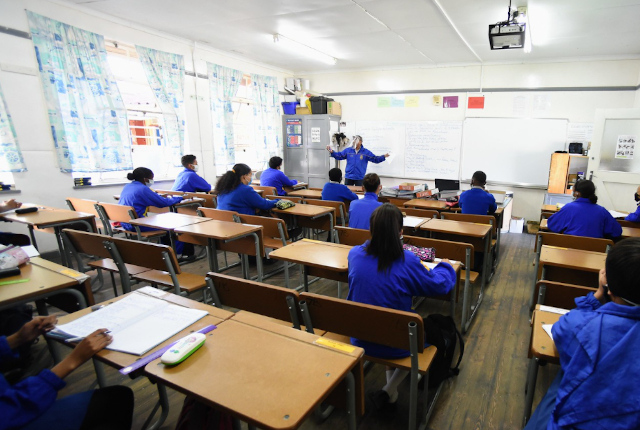This open letter to the ministers of basic education, health, and co-operative & traditional affairs is co-written by Equal Education, the Equal Education Law Centre, the Learning Trust, Legal Resources Centre, the National Association of Social Change Entities in Education and academics.
Dear ministers Angie Motshekga, Joe Phaahla and Nkosazana Dlamini-Zuma,
As schools reopen for 2022, we write to you as a collective of concerned civil society organisations. Over the past two years, learners have been harmed by the amount of time they have been forced to spend at home instead of in the classroom.
This continued time away from school has hurt their access to school meals and psychosocial support and increased dropout rates.
This has particularly affected those in under-resourced public schools (mainly quintile 1-3) that are unable to adhere to the guidelines in response to the Covid pandemic through no fault of their own. This is because of the dire state of infrastructure in many schools, overcrowding and lack of water and toilets.
Each additional day of lost learning has a lasting and lifelong impact on the interests of children and their right to quality basic education. We urge you not to allow this state of affairs to continue into a third year. During a school readiness briefing, we were greatly disappointed by minister Motshekga’s announcement that learners would continue with rotational school attendance. The hope had been that schools would return to full-time attendance in 2022.
Schools reopened in June 2020 after more than two months of hard lockdown across SA. Rotational timetabling was introduced to ensure that learners and teachers were safe in schools and allowed for social distancing. This meant that learners attended school on alternative days or weeks.

Rotational attendance was meant to be a temporary intervention aimed at bringing learners back into the classroom while minimising the risk posed by the virus. However, it has remained the norm for the past 18 months, despite new medical evidence around transmission and the availability of vaccines for teachers, parents and older children.
We have already seen that the continued use of rotational timetabling will have severe consequences for the quality of education. In a presentation to parliament in June last year, the department of basic education (DBE) said that 75% of learning time in 2020 was lost. The National Income Dynamics Study – Coronavirus Rapid Mobile Survey (Nids-Cram) Wave 5 found that learners across the country lost 75-100% of schooling between March 2020 and June 2021.
In May last year, the DBE announced the full return to daily attendance and traditional timetables for all primary school learning (grades R to 7) and schools for learners with special education needs (grades R to 12) from August 2.
All schools unable to return to traditional timetabling were required to inform the head of the provincial education department that they would continue with rotational attendance.
Provincial MECs are now required to submit monthly reports to you, minister Motshekga, which should include reasons why schools cannot return to pre-Covid traditional attendance.
There is no indication whether MECs have submitted these reports. There is also no indication of support being put in place to ensure that all primary schools can return to full capacity. An additional worry is whether the continuation of rotational schooling has simply been rubber-stamped.
In July last year, the ministerial advisory committee (MAC) advised that the harm done to learners attending school on a rotational basis – specifically the cognitive, nutritional, and psychological costs – exceeds the benefits of reduced Covid infections from smaller class sizes. Despite the MAC’s advice, it is alarming that schools are set to continue with rotational timetabling in 2022.
Since the one-metre distancing requirement at primary schools was imposed, the country has moved from Covid alert level 3 to alert level 1. The vaccine is readily available to all adults and children from 12. All teachers have been given the opportunity to be vaccinated, and according to the DBE, uptake has been positive.
Therefore, taking into account all the steps taken to mitigate against rising infections, we urge the department of co-operative governance & traditional affairs to do away with physical distancing requirements in schools.
If the country experiences other Covid waves, as we have seen with the Omicron variant, the DBE must use the risk-adjusted strategy as promised, allowing for context-specific responses. In addition, through the National Coronavirus Command Council and MAC, the government must develop a long-term plan that outlines the education sector’s response to new variants and increases in infections.
We can not continue to allow our children to suffer by having inflexible and detrimental approaches in response to Covid.


